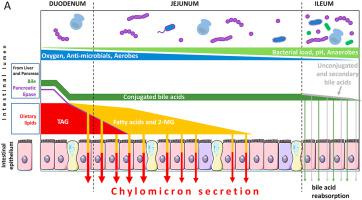Biochimie ( IF 3.3 ) Pub Date : 2020-09-17 , DOI: 10.1016/j.biochi.2020.09.007 Ingrid Lema 1 , João Ricardo Araújo 2 , Nathalie Rolhion 3 , Sylvie Demignot 1

|
Although the jejunum is the main intestinal compartment responsible for lipid digestion and absorption, most of the studies assessing the impact of dietary lipids on the intestinal microbiota have been performed in the ileum, colon and faeces. This lack of interest in the jejunum is due to the much lower number of microbes present in this intestinal region and to the difficulty in accessing its lumen, which requires invasive methods. Recently, several recent publications highlighted that the whole jejunal microbiota or specific bacterial members are able to modulate lipid absorption and metabolism in enterocytes. This information reveals new strategies in the development of bacterial- and metabolite-based therapeutic interventions or nutraceutical recommendations to treat or prevent metabolic-related disorders, including obesity, cardiovascular diseases and malnutrition.
This review is strictly focused on the following triad: dietary lipids, the jejunal epithelium and the jejunal microbiota. First, we will describe each member of the triad: the structure and functions of the jejunum, the composition of the jejunal microbiota, and dietary lipid handling by enterocytes and by microorganisms. Then, we will present the mechanisms leading to lipid malabsorption in small intestinal bacterial overgrowth (SIBO), a disease in which the jejunal microbiota is altered and which highlights the strong interactions among this triad. We will finally review the recent literature about the interactions among members of the triad, which should encourage research teams to further explore the mechanisms by which specific microbial strains or metabolites, alone or in concert, can mediate, control or modulate lipid absorption in the jejunum.
中文翻译:

空肠:饮食脂质和微生物群的研究不足的地方。
尽管空肠是负责脂质消化和吸收的主要肠道区室,但大多数评估膳食脂质对肠道菌群影响的研究都是在回肠,结肠和粪便中进行的。对空肠缺乏兴趣是由于存在于该肠区域中的微生物数量少得多以及由于难以进入其管腔,这需要侵入性方法。最近,一些最近的出版物强调了整个空肠微生物群或特定的细菌成员能够调节肠细胞中的脂质吸收和代谢。这些信息揭示了开发基于细菌和代谢物的治疗性干预措施或治疗或预防与代谢相关的疾病(包括肥胖症)的营养保健建议的新策略。
这篇评论严格集中在以下三方面:饮食脂质,空肠上皮和空肠菌群。首先,我们将描述三联体的每个成员:空肠的结构和功能,空肠微生物群的组成以及通过肠上皮细胞和微生物处理的饮食脂质。然后,我们将介绍导致小肠细菌过度生长(SIBO)的脂质吸收不良的机制,该疾病中空肠微生物群发生改变,并突出了该三联体之间的强相互作用。我们将最终回顾有关三合会成员之间相互作用的最新文献,这应鼓励研究团队进一步探索特定微生物菌株或代谢物单独或共同作用的机制,











































 京公网安备 11010802027423号
京公网安备 11010802027423号